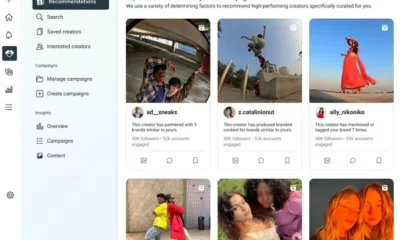SOCIAL
Meta Adds ‘Personal Boundary’ Zones in VR to Limit Harassing Behavior

It’s disappointing, but one thing that you can always be certain of with any socially-aligned technology is that some people are going to use it to harass and abuse others, in any way that they can.
Most recently, that’s come up in virtual reality, with various incidents of women being attacked in Meta’s evolving VR world, in exceedingly concerning ways.
Back in December, The Verge reported that a beta tester for Meta’s Horizon Worlds functionality, which is its social media replacement in VR, was groped by a stranger within the digital realm. Then earlier this month, a woman said that she had been “virtually gang-raped” in the VR environment.
These are obviously major problems, especially as Meta looks to make a bigger shift towards VR as part of its metaverse development. Which is why today, again disappointingly, Meta has been forced to implement a new personal boundary for VR avatars in both Horizon Worlds and Horizon Venues.
As explained by Meta:
“Personal Boundary prevents avatars from coming within a set distance of each other, creating more personal space for people and making it easier to avoid unwanted interactions. Personal Boundary will begin rolling out today everywhere inside of Horizon Worlds and Horizon Venues, and will by default make it feel like there is an almost 4-foot distance between your avatar and others.”
This is why we can’t have nice things.
Of course, functionally, that doesn’t change much in the current VR space, it’s only disappointing in the fact that we need such measures at all. But again, evidently, we do, and with Meta seeking to convert as many people as it can over to its new, more immersive connection spaces – especially with its main app now losing active users – it’s obviously felt the need to implement such protection measures immediately to avoid any further harm and negative reports.
Because as Jeff Goldblum’s character notes in Jurassic Park: “nature finds a way”, which works in both a positive and negative sense. Social media platforms have provided more ways to stay connected with others than ever before, we’re now more able to find more like-minded people, learn more about other cultures, and explore individual niches and interests in ways that simply weren’t possible in times past.
But social media has also facilitated the formation of increasingly harmful groups, the concerted harassment of people with dissenting opinions, the spread of misinformation and disinformation at huge scale, and the objectification and violation of users for any reason that people may choose.
Users should not have to deal with these elements, we should, in theory, be able to utilize these technologies for good, which has been the underlying hope of social media CEOs and visionaries, who’ve often seemingly turned a blind eye to the flip-side of the coin. But the impact of such harms is significant, arguably more significant than the positives, on balance.
But there’s no going back now, social platforms are already embedded into how we interact, which means that the host providers simply have to work at improving their systems to cater for misuse, and counter it wherever they can.
It’s not possible to eliminate such behavior entirely. Again, this is human nature, and as Meta’s executives have repeatedly noted, its platforms are merely a reflection of society and broader societal trends. It’s not Meta’s fault that people have negative impulses and choose to project them via its apps.
But then again, it also is – which is why Meta is doing all it can to address these issues.
VR opens up all new forms of harassment, and will provide a medium for many more incidents like this. And that’s before we get into the more questionable use cases for VR technology, and the impacts that they might have on people’s behavior.
Surely putting users into a more immersive, virtual environment where they can harass and demean people, and commit fictional crimes, is not great for their mental approach to real life, and how they can act in public. Yet, that’s very likely where we’re headed, with Meta set to launch Grand Theft Auto in VR sometime this year.

It does look like an interesting and engaging gaming experience. But the way that characters are treated in GTA is overly negative, and various studies have shown that playing violent video games in 2D, especially GTA, form can increase aggressive behaviors, and desensitize people to violence.
I can only imagine the same applies more directly to a fully immersive experience like this. Of course, GTA VR will be rated R, and will only, theoretically, be available to adults. Just like every other GTA game.
It’s a major concern – when you’re building an alternative world, with more stimulants and more inputs to immerse yourself into an entirely different environment, that also cranks up the risk factors, and could lead to much bigger mental and developmental impacts in different ways.
But again, tech CEOs seem blinded by the positives and the potential of what’s to come. This will replace real-world interactions, and create all new ways to interact, and to share unique experiences with your loved ones, reducing loneliness and enabling virtually anything that you can dream of.
But not all dreams are filtered through a positive lens, and not all people will be aligned in the same approach.
Overlooking the negatives might help Meta make more money, but it will also lead to more real-world harm, in many ways.
Building in buffer zones for avatars is a disappointingly necessary development. But it’s likely only the start.
Source link
SOCIAL
Snapchat Explores New Messaging Retention Feature: A Game-Changer or Risky Move?

In a recent announcement, Snapchat revealed a groundbreaking update that challenges its traditional design ethos. The platform is experimenting with an option that allows users to defy the 24-hour auto-delete rule, a feature synonymous with Snapchat’s ephemeral messaging model.
The proposed change aims to introduce a “Never delete” option in messaging retention settings, aligning Snapchat more closely with conventional messaging apps. While this move may blur Snapchat’s distinctive selling point, Snap appears convinced of its necessity.
According to Snap, the decision stems from user feedback and a commitment to innovation based on user needs. The company aims to provide greater flexibility and control over conversations, catering to the preferences of its community.
Currently undergoing trials in select markets, the new feature empowers users to adjust retention settings on a conversation-by-conversation basis. Flexibility remains paramount, with participants able to modify settings within chats and receive in-chat notifications to ensure transparency.
Snapchat underscores that the default auto-delete feature will persist, reinforcing its design philosophy centered on ephemerality. However, with the app gaining traction as a primary messaging platform, the option offers users a means to preserve longer chat histories.
The update marks a pivotal moment for Snapchat, renowned for its disappearing message premise, especially popular among younger demographics. Retaining this focus has been pivotal to Snapchat’s identity, but the shift suggests a broader strategy aimed at diversifying its user base.
This strategy may appeal particularly to older demographics, potentially extending Snapchat’s relevance as users age. By emulating features of conventional messaging platforms, Snapchat seeks to enhance its appeal and broaden its reach.
Yet, the introduction of message retention poses questions about Snapchat’s uniqueness. While addressing user demands, the risk of diluting Snapchat’s distinctiveness looms large.
As Snapchat ventures into uncharted territory, the outcome of this experiment remains uncertain. Will message retention propel Snapchat to new heights, or will it compromise the platform’s uniqueness?
Only time will tell.
SOCIAL
Catering to specific audience boosts your business, says accountant turned coach

While it is tempting to try to appeal to a broad audience, the founder of alcohol-free coaching service Just the Tonic, Sandra Parker, believes the best thing you can do for your business is focus on your niche. Here’s how she did just that.
When running a business, reaching out to as many clients as possible can be tempting. But it also risks making your marketing “too generic,” warns Sandra Parker, the founder of Just The Tonic Coaching.
“From the very start of my business, I knew exactly who I could help and who I couldn’t,” Parker told My Biggest Lessons.
Parker struggled with alcohol dependence as a young professional. Today, her business targets high-achieving individuals who face challenges similar to those she had early in her career.
“I understand their frustrations, I understand their fears, and I understand their coping mechanisms and the stories they’re telling themselves,” Parker said. “Because of that, I’m able to market very effectively, to speak in a language that they understand, and am able to reach them.”Â
“I believe that it’s really important that you know exactly who your customer or your client is, and you target them, and you resist the temptation to make your marketing too generic to try and reach everyone,” she explained.
“If you speak specifically to your target clients, you will reach them, and I believe that’s the way that you’re going to be more successful.
Watch the video for more of Sandra Parker’s biggest lessons.
SOCIAL
Instagram Tests Live-Stream Games to Enhance Engagement

Instagram’s testing out some new options to help spice up your live-streams in the app, with some live broadcasters now able to select a game that they can play with viewers in-stream.
As you can see in these example screens, posted by Ahmed Ghanem, some creators now have the option to play either “This or That”, a question and answer prompt that you can share with your viewers, or “Trivia”, to generate more engagement within your IG live-streams.
That could be a simple way to spark more conversation and interaction, which could then lead into further engagement opportunities from your live audience.
Meta’s been exploring more ways to make live-streaming a bigger consideration for IG creators, with a view to live-streams potentially catching on with more users.
That includes the gradual expansion of its “Stars” live-stream donation program, giving more creators in more regions a means to accept donations from live-stream viewers, while back in December, Instagram also added some new options to make it easier to go live using third-party tools via desktop PCs.
Live streaming has been a major shift in China, where shopping live-streams, in particular, have led to massive opportunities for streaming platforms. They haven’t caught on in the same way in Western regions, but as TikTok and YouTube look to push live-stream adoption, there is still a chance that they will become a much bigger element in future.
Which is why IG is also trying to stay in touch, and add more ways for its creators to engage via streams. Live-stream games is another element within this, which could make this a better community-building, and potentially sales-driving option.
We’ve asked Instagram for more information on this test, and we’ll update this post if/when we hear back.
-

 PPC5 days ago
PPC5 days ago19 Best SEO Tools in 2024 (For Every Use Case)
-

 MARKETING7 days ago
MARKETING7 days agoStreamlining Processes for Increased Efficiency and Results
-
SEARCHENGINES7 days ago
Daily Search Forum Recap: April 17, 2024
-

 PPC7 days ago
PPC7 days ago97 Marvelous May Content Ideas for Blog Posts, Videos, & More
-

 SEO7 days ago
SEO7 days agoAn In-Depth Guide And Best Practices For Mobile SEO
-
SEARCHENGINES5 days ago
Daily Search Forum Recap: April 18, 2024
-

 MARKETING6 days ago
MARKETING6 days agoEcommerce evolution: Blurring the lines between B2B and B2C
-
SEARCHENGINES4 days ago
Daily Search Forum Recap: April 19, 2024














You must be logged in to post a comment Login